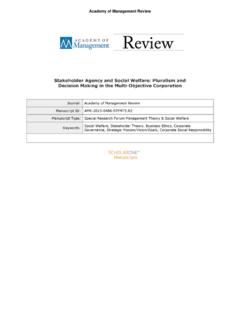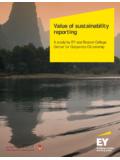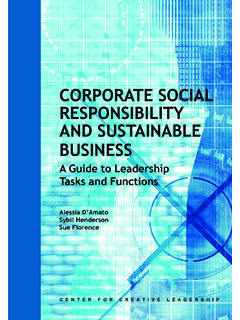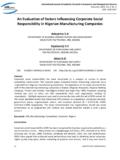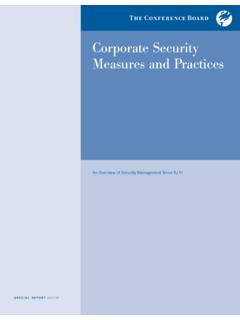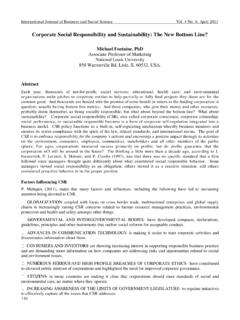Transcription of TOWARDS REFINING THE CONCEPT OF CORPORATE …
1 TOWARDS REFINING THE CONCEPT OF CORPORATE citizenship Jae Hwan Lee Rawls College of Business Administration Area of Management, Box 42101 Texas Tech University Lubbock, TX 79409-2101 Tel: (806) 742-3705 e- mail: Ronald. K. Mitchell Rawls College of Business Administration Area of Management, Box 42101 Texas Tech University Lubbock, TX 79409-2101 Tel: (806) 742-3188 Fax: (806) 742-2308 e- mail: 1 INTRODUCTION Corporations have exerted great influences on society for centuries (Bakan, 2004; Klein, 2000; Nace, 2003; Reich, 2007) and have played important roles in the post-Westphalia order (Hettne, 2000; Palazzo & Scherer, 2008; Scherer & Palazzo, 2007; Scherer, Palazzo, & Baumann, 2006).
2 Given this inordinate power that corporations possess today, it seems almost inevitable that students of CORPORATE citizenship have paid greater attention to corporations responsibilities and duties vis- - vis their stakeholders and society. However, this well-justified focus on CORPORATE social responsibility has unwittingly left the other integral component, CORPORATE rights, unattended in the extant CORPORATE citizenship literature. The lion s share of research has involved prescriptions about what corporations should do to demonstrate CORPORATE social responsibility, but little attention has been given to CORPORATE rights, what a corporation can do.
3 We argue that this paralysis in CORPORATE citizenship research with a lopsided focus on CORPORATE social responsibility is troublesome at least for two reasons. First, Correlative Axiom (Hohfeld, 1923) suggests that a right is created through the imposition of a duty or a responsibility, or vice versa (Kramer, 1998). Following this logic, CORPORATE citizenship is to be best understood symmetrically as a more or less balanced bundle of rights and responsibilities (Van Oosterhout, 2005). Second, in some respects corporations appear to be adolescents that behave immaturely with respect to their rights and responsibilities.
4 While corporations exercise their endowed rights (enfranchised) and fulfill their responsibilities/duties (responsible), they sometimes exercise rights that have not been granted to them (illicit) and do not always fulfill their socially-imposed responsibilities/duties (irresponsible). In addition, corporations assert new rights and responsibilities by expanding the scope of their citizenship beyond what the society has granted to or imposed on them (claimant). These two observations suggest that to fully understand corporations as citizens, the analysis of CORPORATE citizenship needs to be expanded to encompass not only CORPORATE social responsibilities/duties but also CORPORATE rights.
5 Thus, in an attempt to fully capture this phenomenon, we propose a new working definition of CORPORATE citizenship as a dynamic process by which corporations implement and expand their respective CORPORATE rights. DEFINITIONS OF CORPORATE citizenship CORPORATE citizenship has been defined in various ways. In order to ensure clarity and effectiveness in scholarly communication, we introduce a unified lens based on the notion that citizenship is typically conceived of as being symmetrical (van Oosterhout, 2005). Using this scheme, the extant definitions of CORPORATE citizenship can be classified into three groups under two big categories as shown in Table 1.
6 The first category includes definitions of CORPORATE citizenship that emphasize the duties (or responsibilities) side of citizenship of corporations with the rights side of citizenship implied. Within this category are two groups one which defines CORPORATE citizenship through the lens of instrumental stakeholder management and the other which weighs citizenship duties over rights in defining CORPORATE citizenship . The second category is comprised of definitions of CORPORATE citizenship that explicitly mention citizenship rights and duties of corporations. {Insert Table 1 about here} The notion of CORPORATE citizenship entered scholarly discourse as long ago as the late 1950s ( , Gossett, 1957; Johnson, 1958).
7 Johnson (1958: 285; emphasis added) stated that one of the most important changes that have taken place in the current generation as a part of the American social-economic revolution is the development of a new role of CORPORATE citizenship with the corporation recognizing its social and economic responsibility to the whole community. Responsibilities of the corporation to the community underlie many of its earliest definitions of CORPORATE citizenship . For example, drawing upon his CORPORATE social responsibility model (Carroll, 1979), Carroll (1998: 1-2) argued that just as for private citizens, companies are expected to fulfill economic, legal, ethical, and philanthropic responsibilities.
8 Adopting Carroll s (1998) definition, Maignan and Ferrell (2001: 284; see also Post & Berman, 2001) defined CORPORATE citizenship as the extent to which businesses meet the economic, legal, ethical, and discretionary responsibilities imposed by their stakeholders. 2 Matten and Crane (2005: 169) labeled such definitions of CORPORATE citizenship as an equivalent view of CORPORATE citizenship by noting that much of the literature currently uses the CONCEPT in this sense, stressing various aspects of CORPORATE social responsibility, such as sustainability (Marsden, 2000), the stewardship role of business (Reilly & Kyj, 1994) or drawing conceptual lines TOWARDS the stakeholder approach (Davenport, 2000).
9 One of the key characteristics among definitions of CORPORATE citizenship within the equivalent view is that the corporation s responsibilities, duties, or obligations are articulated as definitional attributes, while the citizenship rights side of the corporation is not included in the definitions. However, some definitions, while not including rights attributes, recognize their importance in conceptualizing CORPORATE citizenship ( , CORPORATE rights elements are assumed in the definitions of CORPORATE citizenship ). Two examples are noteworthy ( , Gardberg & Fombrun, 2006; Marsden & Andriof, 1998).
10 First, Gardberg and Fombrun (2006: 330; emphasis added) acknowledged that when businesses are granted the legal and political rights of individual citizens through incorporation, they also are ascribed, explicitly and implicitly, a set of responsibilities. But Gardberg and Fombrun (2006: 330) delimited the boundaries of CORPORATE citizenship in terms of duties only, defining CORPORATE citizenship as the portfolio of socioeconomic activities that companies often undertake to fulfill perceived duties as members of society (Etzioni, 1990; Fombrun, 1997; Wood, 1991). A similar pattern is found in the definition of CORPORATE citizenship , provided by Marsden and Andriof (1998: 329: emphasis added), who asserted that citizenship concerns the rights and duties of a member of a can be thought of as CORPORATE citizens with legal is a political term.

